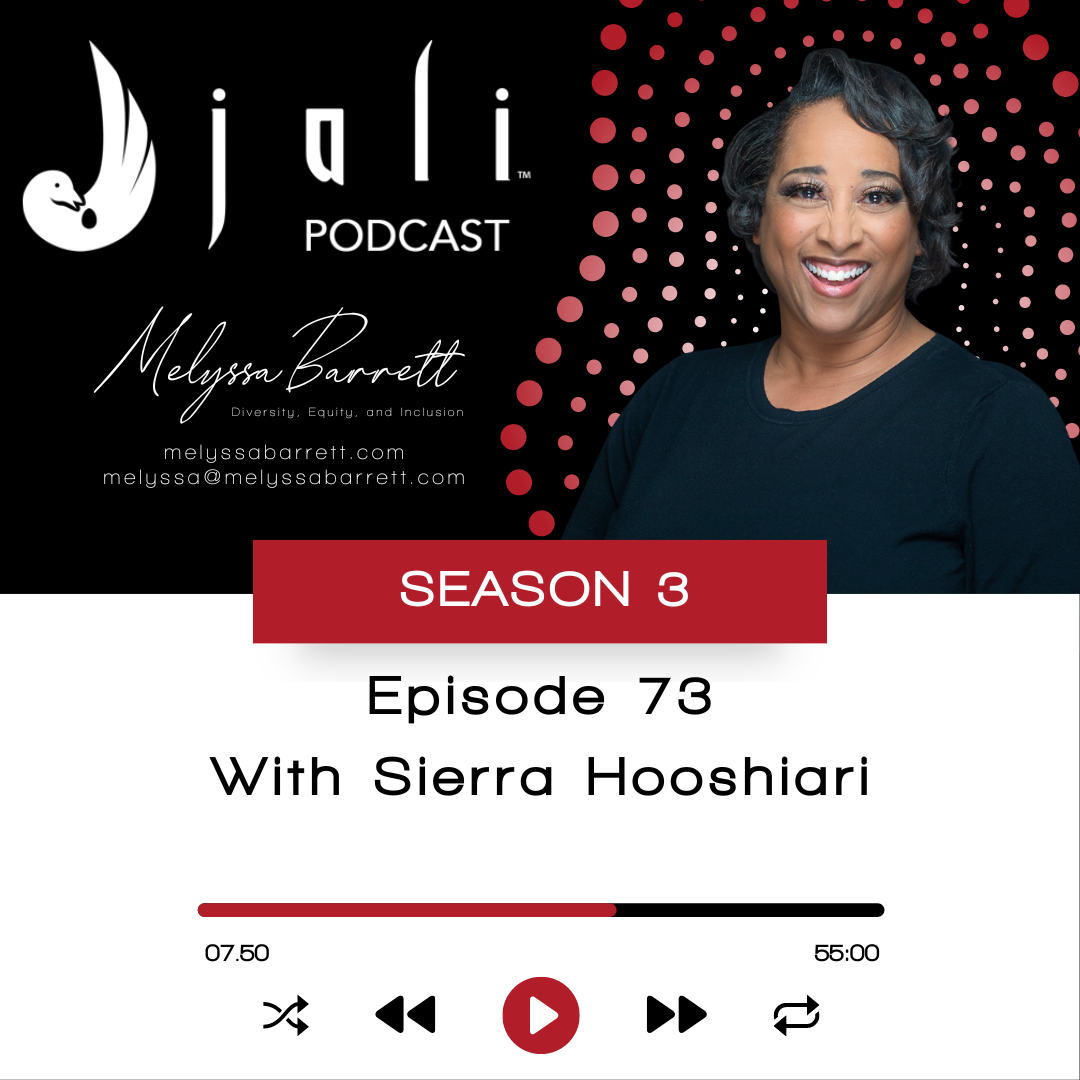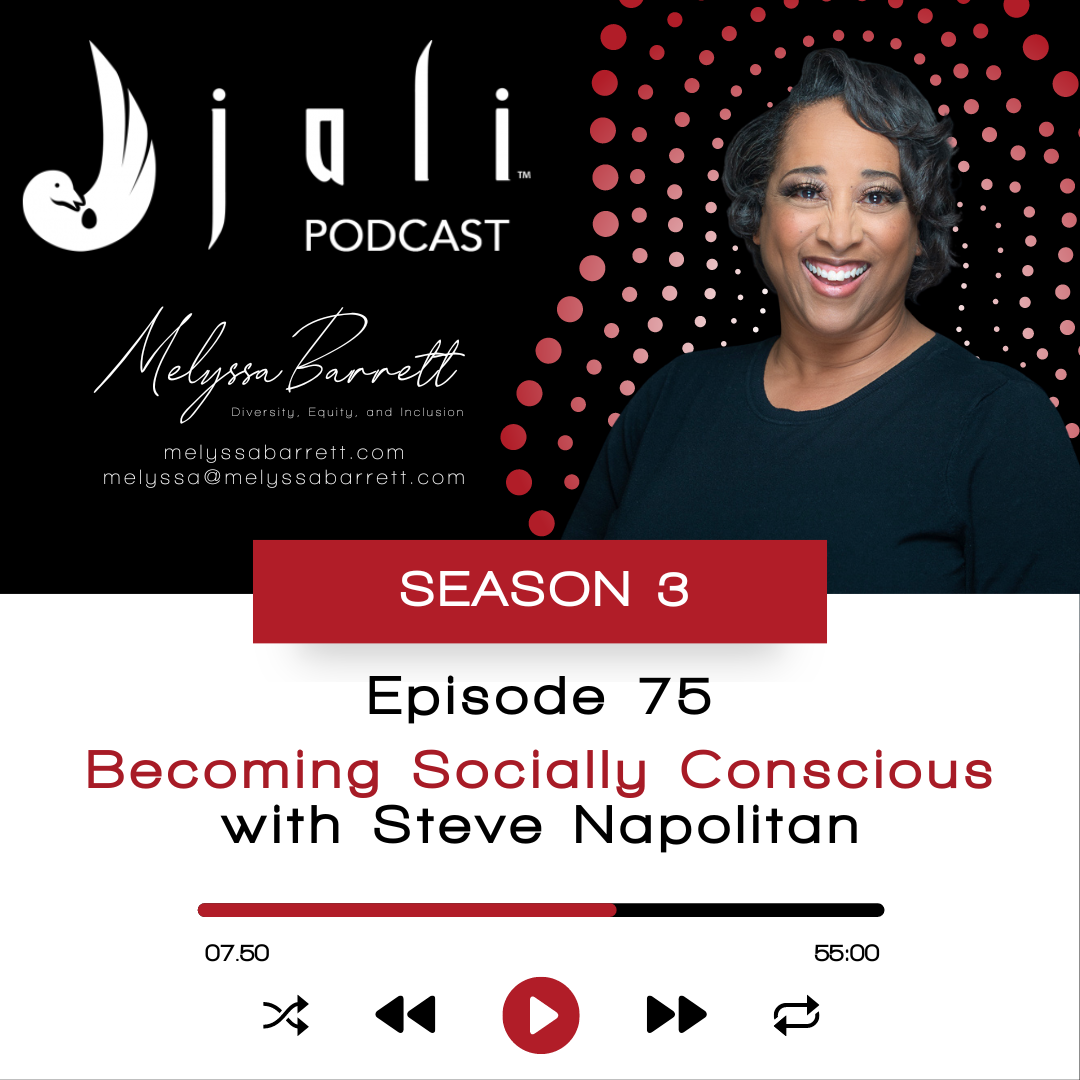
Improving Brain Health – Ep.73
December 22, 2022
Becoming Socially Conscious – Ep.75
January 4, 2023
Improving Brain Health – Ep.73
December 22, 2022
Becoming Socially Conscious – Ep.75
January 4, 2023This week’s episode focuses on Kwanzaa’s first principle, Umoja, by highlighting the connection between our history and culture.
Melyssa Barrett: Welcome to the Jali Podcast. I’m your host, Melyssa Barrett. This podcast is for those who are interested in the conversation around diversity, inclusion, and equity. Each week I’ll be interviewing a guest who has something special to share or is actively part of building solutions in this space. Let’s get started.
Miles: Kwanzaa To strive for, to strive for and maintain, and maintain, unity, unity in the family, in the family, community, community, nation, nation, and race.
Melyssa Barrett: That was my five-year-old grandson, Miles. You can see he can repeat the principle now and continues to learn and ask about Kwanzaa all the time. I do want my grandchildren to have an understanding of these principles, my children also, so they can share them with their friends and be proud of who they are. That they may begin to understand their own history and educate others on our history and our culture.
Kwanzaa is an opportunity to highlight African-American culture, but it is also a product of creative cultural synthesis. So when you think about Kwanzaa, it represents both continental African and diasporan African cultural elements. That means it’s rooted both in the cultural values and practice of Africans on the continent, and in the United States with strict attention to cultural authenticity and values. And the focus is really about making sure that we create a meaningful, principled, and productive life. The values and practices of Kwanzaa are selected from people from all parts of Africa, south and north, west and east in the true spirit of Pan-Africanism. And that’s one of the things that I love is when you think about Kwanzaa, although it is created as an African-American cultural celebration, it really honors continental African and diasporan values.
So this year I’m not going to go into all of the principles because I know I have recorded many of those principles before, and you can always go back to a podcast and listen to those specifically. But one of the things that I wanted to talk about is that there is no coincidence that unity is the first principle of Kwanzaa. If we can achieve unity, the world would definitely be a better place. But we have to start with the smallest unit first. Unity in the family. For some families, lots of families, that is a challenge in itself, to bring unity to the community, nation, and race, may seem nearly impossible, and yet we always want to continue to strive. It is a principle that we must try to integrate. And as divided as we seem, there are so many things that people can actually be united in.
We must give each other some grace, but also we must appreciate our differences. And yes, you can have unity and appreciate others differences. This week, I know by the time this episode comes out, Kwanzaa will have already begun and it will probably be Ujima as it falls on when we release. But one of the things that I just want people to get excited about is the celebration of these principles. Seven days of principles from Umoja, unity, Kujichagulia, self-determination, Ujima, collective work and responsibility, Ujamaa, cooperative economics, Nia, purpose, Kuumba, creativity, and Imani, Faith. And while there are a variety of symbols that are set up on the table, there are several components, fundamental activities within a Kwanzaa celebration.
We always want, I know for me, we always do the libation, not only a libation, but a libation statement as well as a farewell statement, to really make sure that we have the opportunity to call out the names of our ancestors who have passed on, people we want to honor, people we want to make sure our family, our community, is aware of as we go through those celebrations. So if you have not attended a Kwanzaa celebration, I would encourage you to find one, no matter what ethnicity you are, just to learn about it. And I think there’s no better way than to experience one. Typically, our Kwanzaa celebration is a, we tend to do it at the end of a week, although we try to also incorporate it into kind of our dinner time to talk about the principle so that each of us can contribute our thoughts regarding the specific principle.
But then at the end of the week, usually ours is always on the first Saturday after Christmas, we like to do a 90-minute program or so. And I always enjoy, whether it’s storytelling, drumming, singing, poetry, we try to incorporate a lot of different elements into the program, but also make sure that we focus on the ceremony, the rituals, the principles. We try to have kids involved and making sure that they understand the principles. And ideally, I love to see if kids can actually memorize the principle and maybe talk about what that principle means to them or who they may look to that represents a specific principle.
So one of the things that we always try to do is really just focus, so that you’ll find that I think in some cases you may not think you’re creating a tradition, but it has now become a tradition in our household. And I truly appreciate that. I think my kids appreciate that, and now they are starting to celebrate it with their children, which makes me so happy. And I love the fact, when I hear people tell me that they’ve never been to a Kwanzaa and they want to come, or that they are going to begin celebrating Kwanzaa themselves at their own home, that brings joy to me as well. So I’m always interested in, if anybody has questions or just wants information from me on how we have done it for the last 22 or 23 years, I am happy to share. But one thing about Kwanzaa that’s so wonderful is nobody’s Kwanzaas are the same.
And you can get creative with the principles, with Kwanzaa, with how you want to do Kwanzaa in your own house. So there are some of the fundamentals, but I would just encourage everyone to learn, not only about the Kwanzaa celebration, but also about our culture, be a keeper of the culture, and recognize the connection between Continental Africans, diasporan Africans, certainly as part of the United States. But it’s just so wonderful to see so many stories, so many people that we are honoring. And so I would just encourage you to do some research, see how you’re feeling about these principles, and really just try to incorporate them into your lives every day. And one of the things that I always talk about is Kwanzaa every day. And we do have kwanzaaeveryday.com if you just want to go check out the website. But it’s really a focus on what the principles are, how we got started, and it’ll give you a bit of a story about my husband who kind of started this all for our family.
So anyway, at the end of the day, I just want to wish everyone a happy Kwanzaa. If you hear somebody come up to you and say, Habari Gani? The appropriate response would be to give them the principle of the day. So if today is, let’s just say December 26th, if somebody comes up to you and says, Habari Gani, your response should be, Umoja, which is Unity.
And that’s the rest of the week is the same, Habari Gani, Kujichagulia, et cetera. So hopefully you learned a little bit of something today. And if you didn’t, feel free to reach out to me, melyssa@melyssabarrett.com. And I’m happy to chat with you more about Kwanzaa. And for those of you that might be looking for somebody to come in to your organizations and maybe just expose your employees or your audience to Kwanzaa, I’m happy to do that as well. So feel free to reach out and have a great holiday and a happy new year. Take care.
Thanks for joining me on the Jali Podcast. Please subscribe so you won’t miss an episode. See you next week.
